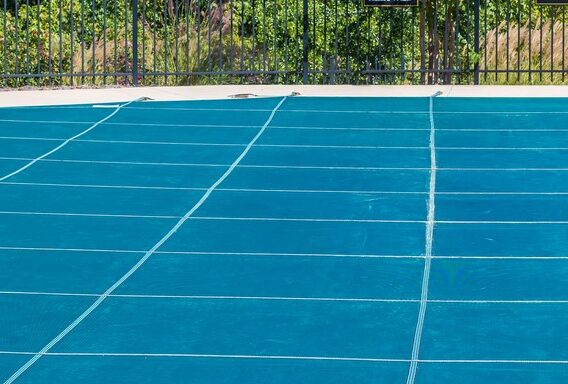Table of Contents
- 1 How to Close Pool for Winter: Complete Guide, Tips, and Step-by-Step Instructions
- 2 Tips to Close Pools in Preparation for Winter
- 3 What You Need To Close Pools
- 4 Steps to Properly Close a Swimming Pool
- 5 Best Pool Cover Brands for Safety and Protection
- 6 Close Pools with Water Bags vs. Safety Covers
- 7 Why Choose a Safety Cover?
- 8 Winter Pool Care and Off-Season Checklist
- 9 Frequently Asked Questions (FAQs)
- 10 The Swimming Pool Store Pool Closing Services
How to Close Pool for Winter: Complete Guide, Tips, and Step-by-Step Instructions
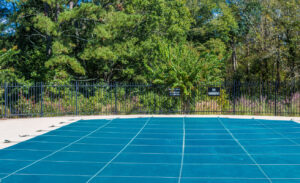
The Swimming Pool Store offers this comprehensive guide to close pools with tips and essential steps to prevent costly damage and ensure a hassle-free pool opening in the spring. Discover how balancing your water chemistry, installing the right safety cover, and protecting your equipment can extend the life of your pool.
Save time, money, and effort by following best practices for pool closings, or contact The Swimming Pool Store to schedule your professional pool closing and order your pool safety cover.
Tips to Close Pools in Preparation for Winter
Learning how to close your pool for the winter is crucial to protect it from the harsh effects of cold weather. Freezing temperatures can damage pool equipment, plumbing, and surfaces if not properly winterized. Taking the right steps to protect your pool now helps extend the life of your pool equipment and prevents costly repairs in the future.
Additionally, a properly closed and winterized pool ensures a smooth and easy pool opening in the spring, reducing the time and effort required to get your pool back in pristine condition. The Swimming Pool Store offers more than 50 years of experience in closing pools and these tips for closing and winterizing your pool.
What You Need To Close Pools
Winters in New England come quickly and can cause damage and costly repairs without the proper steps to close pools. It is important when closing above-ground pools and inground pools to winterize properly to prevent damage and relieve stress when opening in the spring.
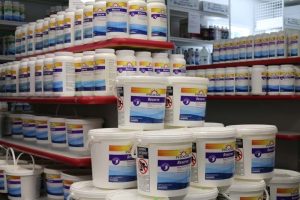 It is essential to balance your pool chemistry first, so you will need test strips or to have your water tested professionally to balance:
It is essential to balance your pool chemistry first, so you will need test strips or to have your water tested professionally to balance:
- Chlorine
- pH
- Alkalinity
- Calcium hardness
You will also need winterizing chemicals, including:
- Chlorine shock
- Algaecide
- Winter clarifier
- Phosphate reducer
- Stain prevention
- Antifreeze
You can usually find winterizing chemicals in a pool closing kit. You will also need closing equipment like the rubber plugs to plug the jets, a gizmo or skimmer plate for your skimmer basket, an air compressor or shop vac with blow settings to blow out the lines before you plug the holes, and of course, your winter safety cover or water tubes for closing.
Steps to Properly Close a Swimming Pool
1. Thoroughly Clean

The first step in properly closing your pool is ensuring that it is clean and free of debris. Begin by removing any leaves, dirt, or other debris from the water using a pool net or vacuum. Thoroughly brush the pool walls and floor to remove algae or buildup. Once the pool is clean, it’s important to balance the water chemistry for the winter season.
2. Balance Pool Water Chemistry
Properly balancing your pool’s water chemistry is an important step to close pools correctly and protects your pool from potential damage during the winter months. Failure to balance key elements such as pH, alkalinity, and calcium hardness can lead to problems like corrosion, staining, and scale buildup, which can be costly and time-consuming to fix when you reopen your pool in the spring.
- pH: Maintaining the correct pH level (between 7.2 and 7.6) is essential for preventing scale buildup and corrosion. A balanced pH ensures that your pool’s water won’t become too acidic or too basic during the off-season, which can damage the pool’s surfaces and equipment.
- Alkalinity: Proper alkalinity (between 80 and 120 ppm) acts as a buffer for pH, helping to
 stabilize it over time. This prevents sudden fluctuations in pH that can negatively impact your pool’s health during the winter.
stabilize it over time. This prevents sudden fluctuations in pH that can negatively impact your pool’s health during the winter. - Calcium Hardness: Ensuring the correct calcium hardness level (between 200 and 400 ppm) prevents plaster etching, surface degradation, and scale formation on your pool surfaces and equipment. This balance is especially important if your pool water remains stagnant for several months.
Adding sodium borate to your pool before closing can further stabilize the water by helping to maintain a consistent pH level throughout the winter. Sodium borate acts as a buffer, making the water less prone to pH fluctuations, reducing the likelihood of algae growth, and improving the overall clarity of your pool water. Learn how to Start Realizing the Many Benefits of Sodium Borate for Pools.
Balancing your pool chemistry now will help protect your pool during the off-season and promote a smooth and hassle-free opening when the warmer months return.
3. Lower the Water Level
Lowering the water level is a crucial step to prevent freezing damage and overflow caused by winter precipitation. For inground pools, lower the water level below the skimmer, typically about 4 to 6 inches. In above-ground pools, the water level should be reduced slightly, but it’s important not to lower it too much, as this could damage the pool liner. For a step-by-step guide specific to above-ground pools, check out our detailed instructions on Closing Above Ground Pools.
4. Drain and Winterize Pool Equipment
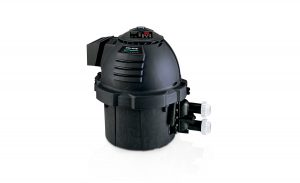 After lowering the water level, it’s time to winterize your pool equipment. Start by backwashing and cleaning your pool filter to ensure it’s free from debris. Next, drain the pool filter, heater, chlorinator, and any other equipment to prevent water from freezing inside the components. Attach a hose to the filter drain plug and let the water completely drain out over a few days. Then you can disconnect the hose and close the valve. If you have a cartridge filter, you should remove the cartridges and clean them. Remove any pool accessories like ladders and skimmer baskets, and store them in a dry, safe place.
After lowering the water level, it’s time to winterize your pool equipment. Start by backwashing and cleaning your pool filter to ensure it’s free from debris. Next, drain the pool filter, heater, chlorinator, and any other equipment to prevent water from freezing inside the components. Attach a hose to the filter drain plug and let the water completely drain out over a few days. Then you can disconnect the hose and close the valve. If you have a cartridge filter, you should remove the cartridges and clean them. Remove any pool accessories like ladders and skimmer baskets, and store them in a dry, safe place.
5. Blow Out and Plugging Lines
To prevent freezing damage to your pool’s plumbing, it’s essential to blow out all water from the lines. Using an air compressor or a shop vacuum, blow air through the plumbing lines until all water is cleared. Once the lines are dry, plug the return lines and skimmers with freeze plugs to prevent any residual water from freezing inside.
You should then add pool antifreeze to the lines to ensure no water remains that could cause freezing and expansion. Double-check that all plugs are secure for the winter season. Store your jug of antifreeze in the skimmer area for additional protection.
6. Install a Winter Pool Cover
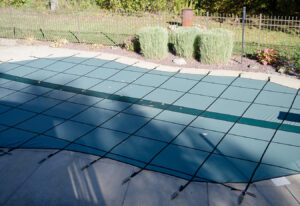 The final step to close pools safely is to install a high-quality pool cover. The right pool cover will protect your pool from debris, reduce water evaporation, and prevent accidental falls. Choose between mesh, solid, or custom pool covers based on your needs and climate. Mesh covers allow water to pass through but keep debris out, while solid covers completely block out water and debris, making them ideal for preventing algae growth. Custom covers provide a perfect fit for uniquely shaped pools.
The final step to close pools safely is to install a high-quality pool cover. The right pool cover will protect your pool from debris, reduce water evaporation, and prevent accidental falls. Choose between mesh, solid, or custom pool covers based on your needs and climate. Mesh covers allow water to pass through but keep debris out, while solid covers completely block out water and debris, making them ideal for preventing algae growth. Custom covers provide a perfect fit for uniquely shaped pools.
Check out our blog on Preventing Winter Pool Cover Failures to learn more about how to close a pool for the winter and for more tips on preventing common pool cover issues. If you’re using water bags to secure your cover, inspect them regularly to ensure they aren’t deflating or slipping. We recommend upgrading to a winter safety pool cover for a more secure and durable solution.
Best Pool Cover Brands for Safety and Protection
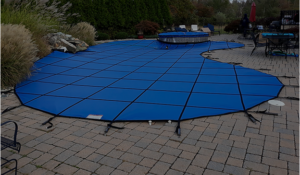 Installing the right pool safety cover is crucial to close pools safely, protect your pool during the off-season, and prevent accidents. Here are leading brands known for their high-quality, durable safety covers:
Installing the right pool safety cover is crucial to close pools safely, protect your pool during the off-season, and prevent accidents. Here are leading brands known for their high-quality, durable safety covers:
- GLI Pool Products Safety Covers: GLI offers a wide range of pool safety covers designed for strength and reliability. Their covers are built to provide superior protection against debris and accidents while withstanding harsh weather conditions.
- Merlin Pool Safety Covers: Merlin is known for producing strong and stylish pool safety covers that provide excellent protection. Their custom covers are designed to fit any pool shape perfectly, offering peace of mind by ensuring that your pool is secure during the off-season.
- LOOP-LOC Pool Covers: LOOP-LOC is a leader in the industry, offering some of the strongest and safest pool covers available. Their covers are known for their durability, and they offer a wide range of colors and styles to complement your backyard aesthetics. LOOP-LOC’s patented design ensures that their covers meet and exceed ASTM safety standards, preventing accidental falls and protecting your pool.
- Latham Pool Covers: Latham offers a variety of solid and mesh pool covers known for their durability and ease of use. Latham’s pool covers are designed with the highest safety standards in mind, offering both protection from debris and preventing accidental falls. Their covers are built to last and provide reliable protection throughout the winter season.
These brands offer some of the best safety covers on the market, giving you peace of mind during the off-season while protecting your pool and loved ones. To learn more about maintaining your pool cover throughout the winter and keeping it in top condition, check out our guide on Winter Maintenance for Pool Covers.
Close Pools with Water Bags vs. Safety Covers
When it comes to closing your pool for the winter, choosing between water bags and safety covers can make a significant difference in the level of protection, convenience, and long-term benefits for your pool.
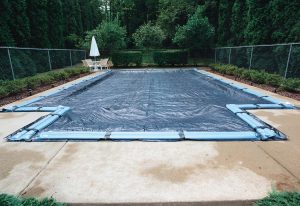 Close Pools with Water Bags
Close Pools with Water Bags
Water bags are often seen as a budget-friendly option for securing a pool cover. They are designed to hold a standard winter cover in place by being placed around the pool’s perimeter. While they can be effective for keeping debris out of the pool, water bags come with a few limitations:
- Affordability and Ease of Use: Water bags are a more affordable option and are relatively easy to install. Simply fill the bags with water and place them around the edges of your pool cover to secure it in place.
- High Maintenance: However, water bags require regular monitoring and maintenance throughout the winter. They are prone to shifting, leaking, or deflating, which can cause the cover to sag or even collapse into the pool. This can lead to potential damage and require more frequent inspections and adjustments.
- Limited Safety: Water bags do not offer the same level of safety as dedicated safety covers. They are not designed to support the weight of a person or pet, so they provide minimal protection against accidental falls into the pool.
Close Pools with Safety Covers
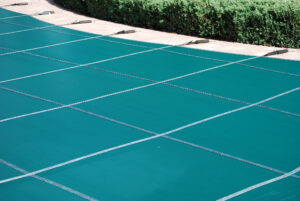 Upgrading to a safety cover provides a more secure, durable, and low-maintenance solution to close pools for the winter. Safety covers are designed to provide full protection, both in terms of preventing debris and ensuring the safety of your family and pets.
Upgrading to a safety cover provides a more secure, durable, and low-maintenance solution to close pools for the winter. Safety covers are designed to provide full protection, both in terms of preventing debris and ensuring the safety of your family and pets.
- Enhanced Safety: Safety covers are engineered to support the weight of children, pets, and even adults, providing a secure barrier that prevents accidents. These covers are tightly anchored to the pool deck, ensuring that they stay in place and offer consistent protection throughout the winter.
- Low Maintenance: Once installed, safety covers require minimal maintenance compared to water bags. They are designed to remain secure without the need for constant adjustments, and their durability ensures long-lasting protection against debris and winter weather.
- Long-Term Investment: While safety covers may involve a higher upfront cost, they are a worthwhile investment in the long run. Their durability and safety features protect your pool and provide peace of mind during the off-season.
Why Choose a Safety Cover?
For pool owners looking for a worry-free winter and a safer, more durable solution, safety covers are the superior choice. They provide better protection against accidents, reduce the need for maintenance, and extend the lifespan of your pool cover and equipment. Whether you have an inground or above-ground pool, investing in a high-quality safety cover ensures that your pool is well-protected all winter long, making it easier to open and enjoy in the spring.
Advantages of Upgrading to a Safety Cover
Safety covers, whether mesh or solid, are designed to prevent accidental falls by supporting the weight of children, pets, and even adults. These covers are tightly secured to the pool deck and do not shift or deflate like water bags, providing superior protection against debris, harsh weather, and accidental falls. Safety covers must meet specific standards and ASTM ratings. Speak with the professionals at The Swimming Pool Store to learn more and make sure your winter pool cover meets safety requirements.
Winter Pool Care and Off-Season Checklist
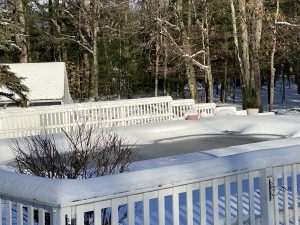 Once your pool is closed for the winter, regular maintenance is still important to ensure everything remains in good condition until spring. Here’s how to maintain your pool during the colder months:
Once your pool is closed for the winter, regular maintenance is still important to ensure everything remains in good condition until spring. Here’s how to maintain your pool during the colder months:
- Inspect the Pool Cover Regularly: Check your pool cover periodically for signs of wear, sagging, or debris buildup. If you are using water bags, make sure they are still properly inflated and holding the cover in place. If you’ve upgraded to a safety cover, ensure that all anchors are secure, and the cover remains tight over the pool.
- Clear Debris Off the Cover: Remove any leaves, branches, or other debris that may accumulate on the cover, as excess weight can cause the cover to sag or even collapse. Use a pool cover pump to remove any water that collects on solid covers.
- Inspect Pool Equipment: Periodically check your pool equipment, such as pumps, filters, and heaters, to ensure they remain winterized and free from damage. Make sure rodents or pests have not taken refuge in your pool area during the colder months.
- Monitor Water Levels: Keep an eye on the water levels under your cover. If levels rise significantly due to snow or rain, you may need to lower them again to prevent any overflow issues.
- Protect Equipment from Rodents:
 As the colder months approach, your pool equipment becomes a prime target for rodents seeking shelter. These pests can chew through wires, nest in heaters, and cause significant damage to your pool system. Properly protecting your pool equipment from rodents during the winter is crucial to avoid costly repairs and ensure everything functions smoothly when the pool is reopened.
As the colder months approach, your pool equipment becomes a prime target for rodents seeking shelter. These pests can chew through wires, nest in heaters, and cause significant damage to your pool system. Properly protecting your pool equipment from rodents during the winter is crucial to avoid costly repairs and ensure everything functions smoothly when the pool is reopened.
Make sure to clean and store any loose items such as pool floats, skimmer baskets, and hoses that could attract rodents Enclose vulnerable areas, such as the heater, pump, and filter, with rodent-proof materials and learn more about mouse-proofing pool heaters. Keeping the pool area clean and clutter-free reduces the likelihood of pests making your equipment their winter home.
Pool Opening After Winter: What to Expect
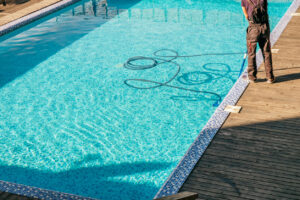
Following the proper procedures to close pools saves both time and money. Here’s what you can expect when it’s time to open your pool after winter:
- Easier Opening Process: A well-closed pool will require much less effort to open in the spring. If your water was properly balanced before closing and your cover remained secure throughout the winter, you can expect fewer issues with algae, debris, and equipment.
- Cleaning and Restoring Water Balance: Once the cover is removed, the first step is to clean out any debris that may have found its way into the pool. After that, test your water chemistry and adjust pH, alkalinity, and chlorine levels to bring everything back into balance. You will typically need to shock the pool after opening to ensure it’s safe for swimming.
- Time and Cost Savings: By following proper procedures to close pools, you’ll save time during the opening process because your pool will be cleaner and better protected. Additionally, the cost of chemicals, repairs, and equipment maintenance will be significantly lower, thanks to the protective measures taken during the pool closing.
A well-executed pool closing sets you up for a smooth, stress-free spring opening, allowing you to enjoy your pool sooner and without the hassle of extensive repairs or cleanup.
Frequently Asked Questions (FAQs)
How to Close a Salt Water Pool for Winter?
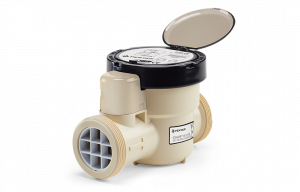 Closing a saltwater pool for winter is similar to closing a traditional chlorine pool, with a few specific adjustments. Start by cleaning the pool thoroughly and balancing the water chemistry, particularly the pH, alkalinity, and calcium hardness. It’s also important to lower the water level, blow out the lines, and drain the saltwater chlorinator to prevent freezing damage. Once the water and equipment are prepared, install a high-quality winter or safety cover to protect the pool throughout the off-season. Be sure to check your saltwater generator’s manufacturer instructions for specific winterization steps. Learn more about saltwater pools including the benefits, how a saltwater pool generator works, and how to convert your pool to a saltwater pool.
Closing a saltwater pool for winter is similar to closing a traditional chlorine pool, with a few specific adjustments. Start by cleaning the pool thoroughly and balancing the water chemistry, particularly the pH, alkalinity, and calcium hardness. It’s also important to lower the water level, blow out the lines, and drain the saltwater chlorinator to prevent freezing damage. Once the water and equipment are prepared, install a high-quality winter or safety cover to protect the pool throughout the off-season. Be sure to check your saltwater generator’s manufacturer instructions for specific winterization steps. Learn more about saltwater pools including the benefits, how a saltwater pool generator works, and how to convert your pool to a saltwater pool.
When to Close the Pool?
The best time to close your pool is when the water temperature consistently drops below 60°F. At this temperature, algae and bacteria are less likely to grow, making it easier to maintain water quality throughout the winter. Most pool owners close their pools in the late fall, after the swimming season ends and before freezing temperatures set in. However, closing too early could lead to water quality issues, so it’s best to monitor your pool’s conditions closely.
How to Close an Above-Ground Pool?
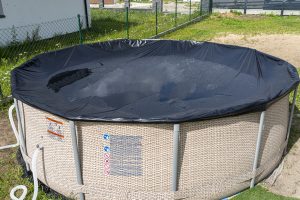
Closing an above-ground pool involves similar steps to closing an inground pool, with a few differences due to the structure. First, clean the pool and balance the water chemistry. Next, lower the water level, but not too much—just enough to prevent overflow from winter precipitation. Remove and store any removable equipment like ladders and hoses. Finally, install a winter cover and secure it with water bags or another method to keep it in place during the off-season. For a detailed guide, visit our page on Closing Above Ground Pools.
It is essential for both safety and long-term maintenance to close pools properly. It protects your pool from freezing temperatures, reduces the need for costly repairs, and ensures that your pool will be ready for a quick and easy opening in the spring. By following the steps outlined in this guide, you can safeguard your pool from winter damage and extend the lifespan of your pool equipment.
The Swimming Pool Store Pool Closing Services

When you schedule a pool closing service with The Swimming Pool Store, our experienced technicians will handle all the necessary steps to protect your pool throughout the winter. We offer comprehensive pool closing services which include:
- Removing ladders, fittings, and rails, and storing them on your property if requested.
- Thoroughly cleaning and inspecting your cartridge, sand, or DE filters to ensure they are in good working condition.
- Winterizing pumps, filters, heaters, and plumbing lines, draining all water from the equipment, and adding essential chemicals to maintain water quality during the winter. This includes liquid sodium hypochlorite shock, winter algaecide, and pool line antifreeze for pools up to 30,000 gallons.
- Blowing out and plugging all circulation lines to prevent freezing, and installing your mesh or solid pool cover securely. If you have a solid cover, we will also fill and place your water bags.
- Documenting any issues we notice with your pool, water quality, or equipment during the closing process.
- Installing your winter pool safety cover. For solid covers, hose-fill the owner’s water bags. Additional water bags may be
 needed at an extra charge.
needed at an extra charge.
Our team will expertly handle the pool closing process; pool owners must ensure that your pool water is clear and balanced before our arrival and that all winterization materials (plugs, pool cover, water bags, etc.) are accessible. Check the condition of your winter safety cover before closing to make sure it is in good condition and was not damaged by rodents while in storage.
The Swimming Pool Store has been providing expert pool closing services and safety cover solutions For over 50 years. Our high-quality covers and professional services ensure your pool is protected all winter long. Contact us today to order a safety cover, schedule your closing, or speak with a swimming pool technician about how to close pools for the winter.

